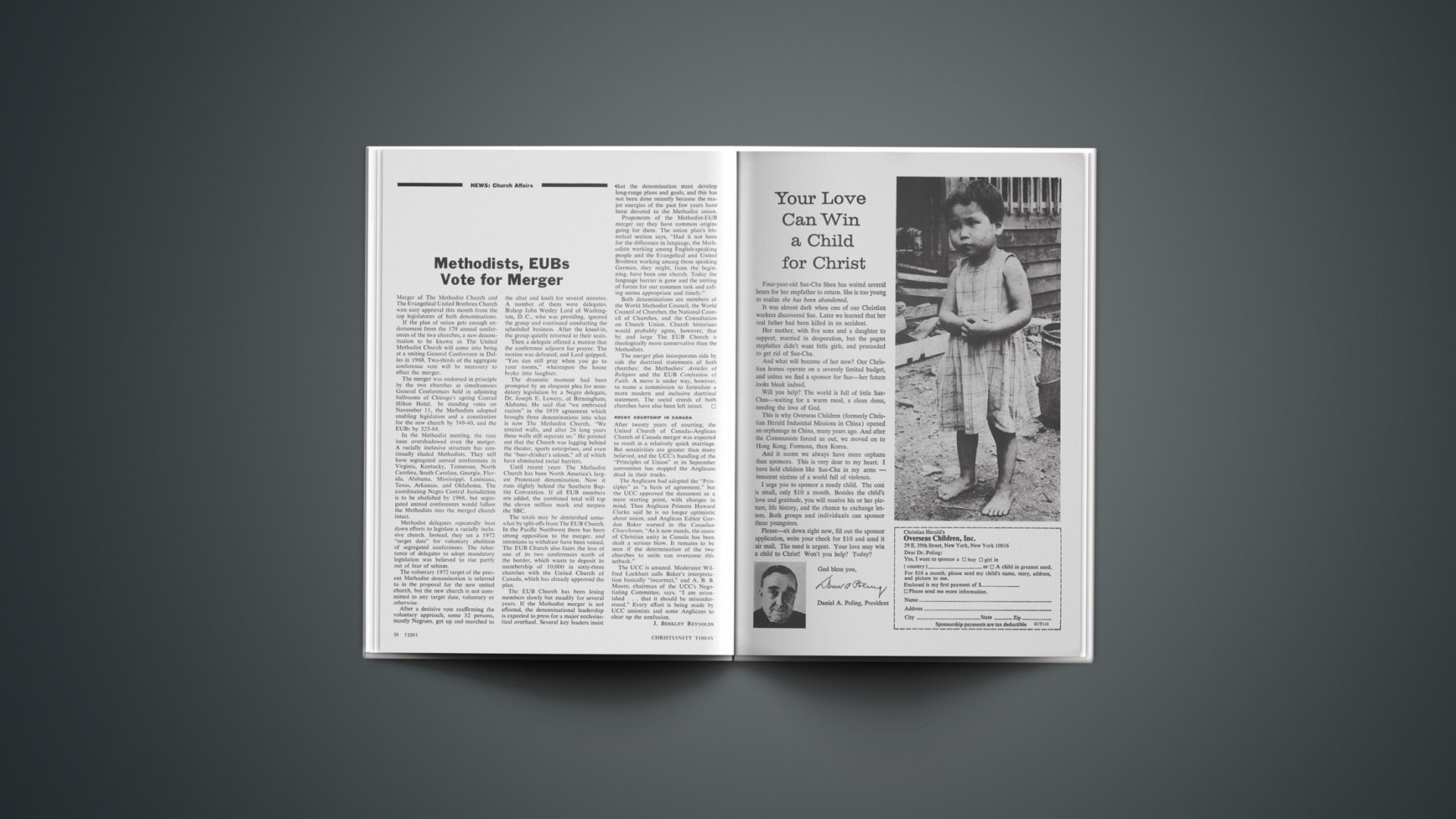Merger of The Methodist Church and The Evangelical United Brethren Church won easy approval this month from the top legislatures of both denominations.
If the plan of union gets enough endorsement from the 178 annual conferences of the two churches, a new denomination to be known as The United Methodist Church will come into being at a uniting General Conference in Dallas in 1968. Two-thirds of the aggregate conference vote will be necessary to effect the merger.
The merger was endorsed in principle by the two churches at simultaneous General Conferences held in adjoining ballrooms of Chicago’s ageing Conrad Hilton Hotel. In standing votes on November 11, the Methodists adopted enabling legislation and a constitution for the new church by 749–40, and the EUBs by 325–88.
In the Methodist meeting, the race issue overshadowed even the merger. A racially inclusive structure has continually eluded Methodists. They still have segregated annual conferences in Virginia, Kentucky, Tennessee, North Carolina, South Carolina, Georgia, Florida, Alabama, Mississippi, Louisiana, Texas, Arkansas, and Oklahoma. The coordinating Negro Central Jurisdiction is to be abolished by 1968, but segregated annual conferences would follow the Methodists into the merged church intact.
Methodist delegates repeatedly beat down efforts to legislate a racially inclusive church. Instead, they set a 1972 “target date” for voluntary abolition of segregated conferences. The reluctance of delegates to adopt mandatory legislation was believed to rise partly out of fear of schism.
The voluntary 1972 target of the present Methodist denomination is referred to in the proposal for the new united church, but the new church is not committed to any target date, voluntary or otherwise.
After a decisive vote reaffirming the voluntary approach, some 32 persons, mostly Negroes, got up and marched to the altar and knelt for several minutes. A number of them were delegates. Bishop John Wesley Lord of Washington, D. C., who was presiding, ignored the group and continued conducting the scheduled business. After the kneel-in, the group quietly returned to their seats.
Then a delegate offered a motion that the conference adjourn for prayer. The motion was defeated, and Lord quipped, “You can still pray when you go to your rooms,” whereupon the house broke into laughter.
The dramatic moment had been prompted by an eloquent plea for mandatory legislation by a Negro delegate, Dr. Joseph E. Lowery, of Birmingham, Alabama. He said that “we embraced racism” in the 1939 agreement which brought three denominations into what is now The Methodist Church. “We erected walls, and after 26 long years these walls still separate us.” He pointed out that the Church was lagging behind the theater, sports enterprises, and even the “beer-drinker’s saloon,” all of which have eliminated racial barriers.
Until recent years The Methodist Church has been North America’s largest Protestant denomination. Now it runs slightly behind the Southern Baptist Convention. If all EUB members are added, the combined total will top the eleven million mark and surpass the SBC.
The totals may be diminished somewhat by split-offs from The EUB Church. In the Pacific Northwest there has been strong opposition to the merger, and intentions to withdraw have been voiced. The EUB Church also faces the loss of one of its two conferences north of the border, which wants to deposit its membership of 10,000 in sixty-three churches with the United Church of Canada, which has already approved the plan.
The EUB Church has been losing members slowly but steadily for several years. If the Methodist merger is not effected, the denominational leadership is expected to press for a major ecclesiastical overhaul. Several key leaders insist that the denomination must develop long-range plans and goals, and this has not been done recently because the major energies of the past few years have been devoted to the Methodist union.
Proponents of the Methodist-EUB merger say they have common origins going for them. The union plan’s historical section says, “Had it not been for the difference in language, the Methodists working among English-speaking people and the Evangelical and United Brethren working among those speaking German, they might, from the beginning, have been one church. Today the language barrier is gone and the uniting of forces for our common task and calling seems appropriate and timely.”
Both denominations are members of the World Methodist Council, the World Council of Churches, the National Council of Churches, and the Consultation on Church Union. Church historians would probably agree, however, that by and large The EUB Church is theologically more conservative than the Methodists.
The merger plan incorporates side by side the doctrinal statements of both churches: the Methodists’ Articles of Religion and the EUB Confession of Faith. A move is under way, however, to name a commission to formulate a more modern and inclusive doctrinal statement. The social creeds of both churches have also been left intact.
Rocky Courtship In Canada
After twenty years of courting, the United Church of Canada—Anglican Church of Canada merger was expected to result in a relatively quick marriage. But sensitivities are greater than many believed, and the UCC’s handling of the “Principles of Union” at its September convention has stopped the Anglicans dead in their tracks.
The Anglicans had adopted the “Principles” as “a basis of agreement,” but the UCC approved the document as a mere starting point, with changes in mind. Thus Anglican Primate Howard Clarke said he is no longer optimistic about union, and Anglican Editor Gordon Baker warned in the Canadian Churchman, “As it now stands, the cause of Christian unity in Canada has been dealt a serious blow. It remains to be seen if the determination of the two churches to unite can overcome this setback.”
The UCC is amazed. Moderator Wilfred Lockhart calls Baker’s interpretation basically “incorrect,” and A. B. B. Moore, chairman of the UCC’s Negotiating Committee, says, “I am astonished … that it should be misunderstood.” Every effort is being made by UCC unionists and some Anglicans to clear up the confusion.
J. BERKLEY REYNOLDS










